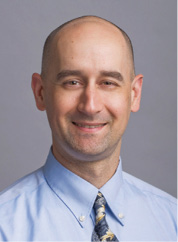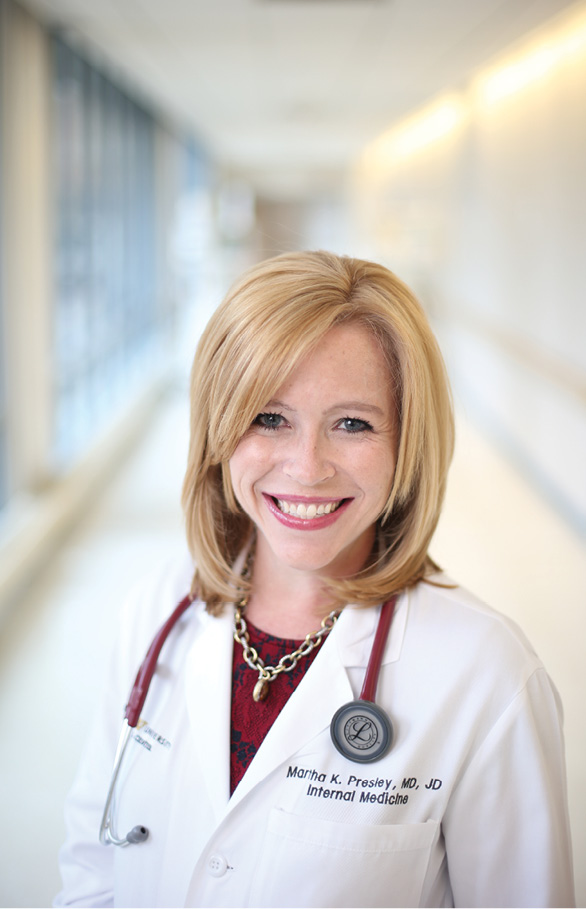By Grace Renshaw
Vanderbilt’s J.D./M.D. program, started in 2001, was designed to allow students to become fully engrossed in each school separately, ensuring the development of two distinct viewpoints during their six years of study. While graduates tend to practice in just one of the professions, their studies allow remarkable insights into today’s complex issues. These three alumni, including the first graduate of Vanderbilt’s program, are focusing their careers on both patient care and health care policy.
David Chooljian, J.D./M.D.’07

David Chooljian realized he wanted to address questions in medical ethics while watching a debate over organ donation unfold as a freshman at UCLA in 1998. In the debate, transplant professionals proposed changing the donation default from presumed refusal to presumed consent to reduce lengthy waits for organs when potential donors had no documented preference. “People’s positions on that proposal were very predictable,” Chooljian recalled. “If you asked a transplant surgeon, you got one answer. If you asked a theologian, you got the other. I thought, ‘Wouldn’t it be a good thing if someone had a foot in both camps?’ ”
Chooljian changed his major from pre-med to anthropology with the aim of earning graduate degrees in both medicine and law and then focusing on clinical medical ethics. Both Vanderbilt and another top university accepted him for both law and medical school, but the other school insisted he complete his law coursework first. “I’d just taken all the pre-med science courses and I didn’t want to relearn that in three years,” he recalled. “Vanderbilt said, ‘Our goal is to make you the best doctor and lawyer we can—to give you the best of both worlds.’ That struck a chord.”
As Vanderbilt’s first J.D./M.D. student, Chooljian started law school after two years of medical classes. “The big adjustment was going from a very reductive way of thinking to a very expansive way of thinking,” he said. “In medicine, a core element is the differential diagnosis: You come up with a set of possibilities and a set of measurements and see which possibility comes to the top. In law, the thinking is much more expansive—you have to know all of the potential iterations and be able to assess the strengths and weaknesses of any party’s position in a given conflict.”
After earning both degrees in 2007, Chooljian accepted a residency in internal medicine at the Cleveland Clinic, noted for its bioethics program, and then was a pulmonary and critical care fellow at Stanford University. He now commutes between the University of Chicago, where he has a four-year fellowship in advanced medical ethics in conjunction with the Department of Veterans Affairs, and Loma Linda (California) Medical School, where he is an assistant professor and practices at the VA’s Loma Linda Health System.
Chooljian divides his time between work as an attending physician in Loma Linda’s critical care unit and advising medical professionals in Chicago on ethical issues. “End-of-life care and the appropriateness of ongoing therapies are the most common ethical consultations,” he said. He also helps medical staff identify “appropriate surrogate decision-makers” for patients unable to advocate for themselves.
Chooljian finds that often “legal considerations trump the ethical recommendation.” He cites a case in which a patient had, in the presence of his son, completed a living will stating that he did not want life-sustaining measures, and also signed durable power of attorney allowing his son to make medical decisions for him if he were mentally incapacitated. When the man suffered a stroke that caused severe brain damage, his son demanded life-sustaining treatment.
The durable power of attorney prevailed, and the patient received treatment. “The client here was not the patient or the providers, but the VA system,” Chooljian explained. “And the best advice the VA’s lawyer could give their client was to minimize risk.”
Martha Presley, J.D./M.D.’10, B.S.’04

As a doctor and budding policymaker, Martha Presley was drawn to palliative medicine because “it facilitates doctoring the entire person rather than a single medical event.”
“Physicians are trained to intervene in a crisis and ‘fix’ an acute problem,” Presley explained. “But our lives and health are a continuum of experiences. Treating people across that continuum—a more holistic approach to patient care—is a paradigm shift that is coming in medicine, but slowly.”
Presley just finished her second year as assistant professor of clinical medicine in Vanderbilt Medical Center’s Division of Hospital Medicine and joined the Palliative Medicine Program in July as a fellow. She is also a policy associate working with former Senate Majority Leader Bill Frist, a heart and lung transplant surgeon, whose policy work focuses on education, cultural change and advancement of reform in multiple areas of health care.
“Many people hear the term ‘palliative care’ and think hospice,” Presley said. “It’s actually much broader, addressing the gap between curative treatment and ‘comfort care’ by focusing on a patient’s goals and quality of life. Palliative medicine is of particular interest in the policy world because of its potential to impact cost and create efficiencies in the coordination of care for our aging and chronically ill population.”
Her enthusiasm for the palliative care model springs from her pragmatic observation that the care chronically ill patients receive is often limited by payment models rather than what is in the patient’s best interest or preference. “Current insurance models pay for medicines and procedures, not complex coordination of care at the end of life,” she said. “But a patient-centered focus with a goal of quality of life is what gets the patient to their grandchild’s wedding or ensures they die at home with their family. Changing the model means changing the way we practice medicine as well as payment reform.”
Presley did not realize she wanted to earn both a medical and a law degree until midway through her first year of law school in 2004. “I seriously questioned my choice to pursue law that first year,” she confessed. “During my second year, I began to see the potential for working at the intersection of law, policy and medicine. The practice of medicine is embroiled in policy decisions and regulatory changes often made by people who have never cared for patients. I wanted to change that.”
One of Vanderbilt’s strengths, Presley notes, is its support of nontraditional educational tracks. “From law school to medical school to my residency here in internal medicine, the Vanderbilt faculty at both schools supported my efforts to work on cross-disciplinary projects,” she said. “I began looking at Constitutional privacy issues regarding vaccines in a law school ethics class and was able to continue that project with [bioethics expert] Dr. Ellen Clayton during my residency. My work experience has proven to me that law and medicine are synergistic disciplines, and my time at the law school was integral in opening my mind to that possibility.”
C.J. Stimson, J.D./M.D.’10

Launching a career in law or medicine wasn’t C.J. Stimson’s plan after his graduation from the College of William & Mary. A gifted college baseball player, he hoped to spend a few years playing professional baseball. “I wasn’t drafted out of college, but was invited to work out with the Chicago White Sox,” he said. “I was upset that this didn’t lead to a spring training invitation. But I was planning to apply to medical school regardless.”
However, Stimson first accepted a paid staff position as a congressional liaison with the Middle East Institute, a nonprofit think tank in Washington, D.C. He was there during the run-up to the war in Iraq, and the experience changed the course of his career. “It was my first full immersion in the public policy sphere. I realized I wanted to be involved, and that a law degree would be invaluable,” he recalled. His search for J.D./M.D. dual-degree programs led him to Vanderbilt. “It’s one of the few institutions in the country with top-ranked law and medical schools, and it’s in Nashville, the center of our country’s health care policy community,” he said.
More than a decade later, Stimson is finishing his chief resident year in Vanderbilt’s urologic surgery program. This summer, he heads to The Johns Hopkins Hospital for a two-year appointment as the Warburton-Jewett Fellow in Urologic Oncology, where he will specialize in surgical treatments for genitourinary cancer. During this fellowship, he will also serve as the American Urological Association’s first H. Logan Holtgrewe Legislative Fellow. “Combining these two fellowships allows me to dedicate one year to the operating room and one year to health policy research,” he explained.
Stimson is excited about that balance because it allows him to apply his experiences treating patients directly to high-level policy decisions. “We have armies of biostatisticians and health services researchers looking at data, and policymakers writing rules and regulations and creating payment models to incentivize surgeons to do what the data says works best,” he said. “But what’s rare are surgeons with both the perspective from the patient’s bedside and fluency in the language of public policy. That’s the space where I want to live and where I think my dual degree can make a real difference.”
Surgery is Stimson’s first love, and he plans to specialize in the surgical treatment of genitourinary cancer throughout his career. Given the choice between writing a scholarly article on health care policy—he has written two book chapters about medical malpractice—and surgery, “I prefer taking out a bladder or a prostate,” he confessed. “Doing surgery is really satisfying. You have a person with a very serious problem, and you can fix it.”
But he finds the prospect of influencing health care policy in ways that have a positive impact on patients and doctors compelling. “I made a decision to spend a lot of time and effort to pick up an additional professional skill set, and I’m using it to apply my experience with patients to policy decisions,” he said. “The dual degree could not have worked out any better.”